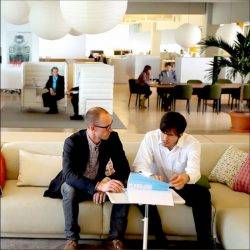To provide the best experiences, we use technologies like cookies to store and/or access device information. Consenting to these technologies will allow us to process data such as browsing behaviour or unique IDs on this site. Not consenting or withdrawing consent, may adversely affect certain features and functions.
The technical storage or access is strictly necessary for the legitimate purpose of enabling the use of a specific service explicitly requested by the subscriber or user, or for the sole purpose of carrying out the transmission of a communication over an electronic communications network.
The technical storage or access is necessary for the legitimate purpose of storing preferences that are not requested by the subscriber or user.
The technical storage or access that is used exclusively for statistical purposes.
The technical storage or access that is used exclusively for anonymous statistical purposes. Without a subpoena, voluntary compliance on the part of your Internet Service Provider, or additional records from a third party, information stored or retrieved for this purpose alone cannot usually be used to identify you.
The technical storage or access is required to create user profiles to send advertising, or to track the user on a website or across several websites for similar marketing purposes.
 The potential for bias in the use of algorithms in crime and justice, financial services, recruitment and local government will be investigated by the UK government’s new Centre for Data Ethics and Innovation (CDEI). The CDEI will explore the potential for bias in existing systems and to support fairer decision-making. This may include increasing opportunities for those in the job market in existing recruitment and financial services systems. It will also explore opportunities to boost innovation in the digital economy. (more…)
The potential for bias in the use of algorithms in crime and justice, financial services, recruitment and local government will be investigated by the UK government’s new Centre for Data Ethics and Innovation (CDEI). The CDEI will explore the potential for bias in existing systems and to support fairer decision-making. This may include increasing opportunities for those in the job market in existing recruitment and financial services systems. It will also explore opportunities to boost innovation in the digital economy. (more…)




















 All the chatter around the growth of flexible working might suggest it has now become the norm, but an academic paper refutes that view by revealing a third of all UK workers believe those who work flexibly create more work for others. A similar proportion believe their career will suffer if they use flexible working arrangements. This is the main finding from Dr Heejung Chung from the University of Kent who set out to analyse data from the 2011 Work-Life Balance Survey conducted by the government. Specifically, she wanted to examine whether stigma against flexible workers exists, who is most likely to hold such beliefs and who is most likely to suffer from it. The research also found that the majority of respondents that held negative views against flexible workers were male, while women and especially mothers were the ones who were most likely to suffer from such stereotypes.
All the chatter around the growth of flexible working might suggest it has now become the norm, but an academic paper refutes that view by revealing a third of all UK workers believe those who work flexibly create more work for others. A similar proportion believe their career will suffer if they use flexible working arrangements. This is the main finding from Dr Heejung Chung from the University of Kent who set out to analyse data from the 2011 Work-Life Balance Survey conducted by the government. Specifically, she wanted to examine whether stigma against flexible workers exists, who is most likely to hold such beliefs and who is most likely to suffer from it. The research also found that the majority of respondents that held negative views against flexible workers were male, while women and especially mothers were the ones who were most likely to suffer from such stereotypes.
 A sudden reversal in the growth in the number of both EU and non-EU migrants in employment in the UK could hit employer plans to take on more staff and worsen skills and labour shortages, according to the latest quarterly Labour Market Outlook from the CIPD and The Adecco Group. While the net employment balance – a measure of the difference between the proportion of employers who expect to increase staff levels and those who expect to decrease staff levels – has remained extremely positive at +22 (compared to +23 in Q3 2018), among employers which currently have vacancies, seven in ten (70 percent) report that at least some of their vacancies are proving hard-to-fill, higher than in Summer 2018 (66 percent) and Spring 2018 (61 percent).
A sudden reversal in the growth in the number of both EU and non-EU migrants in employment in the UK could hit employer plans to take on more staff and worsen skills and labour shortages, according to the latest quarterly Labour Market Outlook from the CIPD and The Adecco Group. While the net employment balance – a measure of the difference between the proportion of employers who expect to increase staff levels and those who expect to decrease staff levels – has remained extremely positive at +22 (compared to +23 in Q3 2018), among employers which currently have vacancies, seven in ten (70 percent) report that at least some of their vacancies are proving hard-to-fill, higher than in Summer 2018 (66 percent) and Spring 2018 (61 percent). 









March 5, 2019
Designing a better workforce: how workplace design can impact wellbeing
by Mary Lawrence • Comment, Wellbeing, Workplace design
(more…)